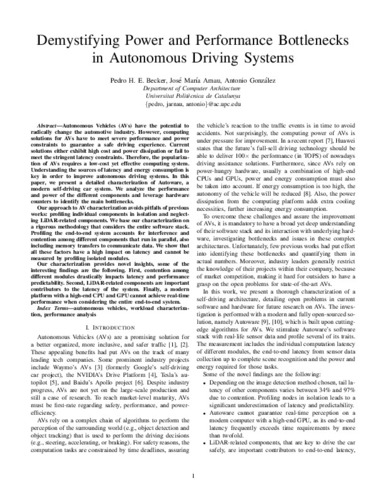Mostra el registre d'ítem simple
Demystifying power and performance bottlenecks in autonomous driving systems
| dc.contributor.author | Exenberger Becker, Pedro Henrique |
| dc.contributor.author | Arnau Montañés, José María |
| dc.contributor.author | González Colás, Antonio María |
| dc.contributor.other | Universitat Politècnica de Catalunya. Doctorat en Arquitectura de Computadors |
| dc.contributor.other | Universitat Politècnica de Catalunya. Departament d'Arquitectura de Computadors |
| dc.date.accessioned | 2020-12-16T13:50:09Z |
| dc.date.available | 2020-12-16T13:50:09Z |
| dc.date.issued | 2020 |
| dc.identifier.citation | Exenberger, P.; Arnau, J.; González, A. Demystifying power and performance bottlenecks in autonomous driving systems. A: IEEE International Symposium on Workload Characterization. "2020 IEEE International Symposium on Workload Characterization: 27–29 October 2020, online event: proceedings". Institute of Electrical and Electronics Engineers (IEEE), 2020, p. 205-215. ISBN 978-1-7281-7645-1. DOI 10.1109/IISWC50251.2020.00028. |
| dc.identifier.isbn | 978-1-7281-7645-1 |
| dc.identifier.uri | http://hdl.handle.net/2117/334539 |
| dc.description | ©2020 IEEE. Personal use of this material is permitted. Permission from IEEE must be obtained for all other uses, in any current or future media, including reprinting/republishing this material for advertising or promotional purposes,creating new collective works, for resale or redistribution to servers or lists, or reuse of any copyrighted component of this work in other works. |
| dc.description.abstract | Autonomous Vehicles (AVs) have the potential to radically change the automotive industry. However, computing solutions for AVs have to meet severe performance and power constraints to guarantee a safe driving experience. Current solutions either exhibit high cost and power dissipation or fail to meet the stringent latency constraints. Therefore, the popularization of AVs requires a low-cost yet effective computing system. Understanding the sources of latency and energy consumption is key in order to improve autonomous driving systems. In this paper, we present a detailed characterization of Autoware, a modern self-driving car system. We analyze the performance and power of the different components and leverage hardware counters to identify the main bottlenecks. Our approach to AV characterization avoids pitfalls of previous works: profiling individual components in isolation and neglecting LiDAR-related components. We base our characterization on a rigorous methodology that considers the entire software stack. Profiling the end-to-end system accounts for interference and contention among different components that run in parallel, also including memory transfers to communicate data. We show that all these factors have a high impact on latency and cannot be measured by profiling isolated modules. Our characterization provides novel insights, some of the interesting findings are the following. First, contention among different modules drastically impacts latency and performance predictability. Second, LiDAR-related components are important contributors to the latency of the system. Finally, a modern platform with a high-end CPU and GPU cannot achieve real-time performance when considering the entire end-to-end system. |
| dc.description.sponsorship | This work has been supported by the the CoCoUnit ERC Advanced Grant of the EU’s Horizon 2020 program (grant No 833057) and the Spanish State Research Agency under grant TIN2016-75344-R (AEI/FEDER, EU). |
| dc.format.extent | 11 p. |
| dc.language.iso | eng |
| dc.publisher | Institute of Electrical and Electronics Engineers (IEEE) |
| dc.subject | Àrees temàtiques de la UPC::Informàtica::Robòtica |
| dc.subject | Àrees temàtiques de la UPC::Informàtica::Arquitectura de computadors |
| dc.subject.lcsh | Autonomous vehicles |
| dc.subject.other | Workload characterization |
| dc.subject.other | Performance analysis |
| dc.title | Demystifying power and performance bottlenecks in autonomous driving systems |
| dc.type | Conference report |
| dc.subject.lemac | Vehicles autònoms |
| dc.contributor.group | Universitat Politècnica de Catalunya. ARCO - Microarquitectura i Compiladors |
| dc.identifier.doi | 10.1109/IISWC50251.2020.00028 |
| dc.description.peerreviewed | Peer Reviewed |
| dc.relation.publisherversion | https://ieeexplore.ieee.org/document/9251251 |
| dc.rights.access | Open Access |
| local.identifier.drac | 30008140 |
| dc.description.version | Postprint (author's final draft) |
| dc.relation.projectid | info:eu-repo/grantAgreement/EC/H2020/833057/EU/CoCoUnit: An Energy-Efficient Processing Unit for Cognitive Computing/CoCoUnit |
| dc.relation.projectid | info:eu-repo/grantAgreement/MINECO/1PN/TIN2016-75344-R |
| local.citation.author | Exenberger, P.; Arnau, J.; González, A. |
| local.citation.contributor | IEEE International Symposium on Workload Characterization |
| local.citation.publicationName | 2020 IEEE International Symposium on Workload Characterization: 27–29 October 2020, online event: proceedings |
| local.citation.startingPage | 205 |
| local.citation.endingPage | 215 |


